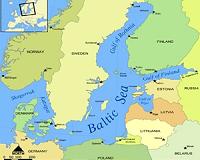 |
Algiers, Algeria (UPI) Sep 1, 2010 Algeria's recent invitation to India to join the $13 billion, delay-plagued Trans-Sahara Gas Pipeline project is an indirect acknowledgment the project's in "deep trouble," an African business Web site says. "The prospect of a quick start to the pipeline has dimmed even further since the beginning of the year with the departure of two of its strongest champions over the past decade, Algerian Oil Minister Chakib Khelil and Nigerian Energy Minister Rilwanu Lukman," Paris's Africa Intelligence reported Tuesday. The project, known as TSGP, would supply up to 30 billion cubic meters of natural gas per year to the European Union and is expected to be operational by 2015. It will run some 2,600 miles from Nigeria, across Niger to Algeria's Mediterranean gas export terminals at el Kala and Beni Safi, then by two existing undersea pipelines to Europe. The European Union is a strong supporter of the ambitious project, agreed by the three African participants July 3, 2009, because it will help the Europeans break loose from their dependency on Russian gas. Algeria's ambassador to India, Echarif Mohammed-Hacene, announced the invitation to India Aug. 22 in New Delhi, saying, "We need more foreign partners outside Europe for this project." The envoy "is doing his best to set a fresh spur to a gigantic project that investors are spurning," Africa Intelligence reported. Although France's Total, Russia's state-owned Gazprom giant, Repsol of Spain and Royal Dutch Shell have expressed interest to help build the pipeline, "nobody has promised any money," African Intelligence said. "Indeed, the oil companies' interest in TSGP appears purely political. By paying lip service to the project they hope to curry favor with the Algerian and Nigerian governments and thus push their own agendas." Most of these oil majors are interested in extending their interests in Algeria and Nigeria, two of Africa's leading producers. "The pipeline's prospects are further dampened by discoveries of huge quantities of shale gas in the United States," the Web site added. Another problem, which has dogged the project from the start, is security, since the pipeline runs through three countries that have been troubled by insurgencies and terrorism. Nigeria's main militant group, the Movement for the Emancipation of the Niger Delta, the main oil-producing zone, has been waging an armed campaign against the country's oil industry for five years that has slashed production by one-third. MEND has threatened to move against the TSGP and the 660 miles of pipeline that will run through Nigeria from the southern Warri region. Niger's portion covers 520 miles through territory where Touareg tribal guerrillas staged two major uprisings in the 1990s and more recently in 2007-09. That was only ended by a cease-fire because of rifts within the main group, the Mouvement des Nigeriens pour la Justice, and tensions remain high. MNJ's fighters have in the past concentrated on attacking Niger's uranium industry, disrupting production of the former French colony's economic mainstay. The MNJ has allegedly collaborated with the southern wing of al-Qaida in the Islamic Maghreb, although the Jamestown Foundation, a Washington think tank that monitors global terrorism, says that threat may have been overstated. AQIM, which is largely composed of Algerian jihadists, is active in the Sahara and semi-arid Sahel regions in Algeria and has attacked oil facilities in the north. It remains a serious problem, though not a threat to the Algiers government. But Algeria will have the largest stretch of the pipeline, 1,440 miles, and protecting that in the desert wastes will be a major problem. "Security threats are too significant to be ignored, undermining the economic viability of the project," Jamestown concluded in a recent report on the TSGP. "Security costs are likely to be very high Once completed, the pipeline will need constant patrolling and expensive surveillance systems to protect this infrastructure from potential security threats. "All these factors are liable to raise costs beyond profitability for this extremely ambitious project," Jamestown noted.
Share This Article With Planet Earth
Related Links Powering The World in the 21st Century at Energy-Daily.com
 Poland, Germany face off over LNG terminal
Poland, Germany face off over LNG terminalWarsaw, Poland (UPI) Sep 1, 2010 Germany and Poland have faced off over a Polish liquefied natural gas terminal to be built on the Baltic Sea coast. Poland in July signed a deal with a consortium led by Italy's Saipem to build an LNG terminal at the port of Swinoujscie, next to the border with Germany. Construction was to start this month but Germany has called for a re-evaluation of the permits. Berlin asked Po ... read more |
|
| The content herein, unless otherwise known to be public domain, are Copyright 1995-2010 - SpaceDaily. AFP and UPI Wire Stories are copyright Agence France-Presse and United Press International. ESA Portal Reports are copyright European Space Agency. All NASA sourced material is public domain. Additional copyrights may apply in whole or part to other bona fide parties. Advertising does not imply endorsement,agreement or approval of any opinions, statements or information provided by SpaceDaily on any Web page published or hosted by SpaceDaily. Privacy Statement |